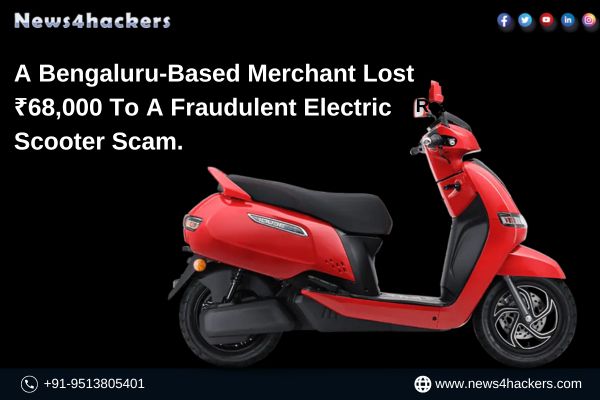A Bengaluru-Based Merchant Lost ₹68,000 To A Fraudulent Electric Scooter Scam.

A Bengaluru-Based Merchant Lost ₹68,000 To A Fraudulent Electric Scooter Scam.
A scam incident experienced by a resident of Bangalore emphasizes the importance of consumer vigilance.

Bengaluru: Apurva Arora, a 55-year-old entrepreneur hailing from Bengaluru, aspired to swiftly navigate on the most advanced electric scooter available. Unbeknownst to him, his enthusiasm would be seized by a cybercriminal group hiding in the virtual realm.

Arora’s pursuit of an e-scooter led him to a seemingly authentic website, meticulously designed by fraudulent individuals. He became ensnared in a prevalent online deception: sponsored links disguised as authentic content. With a single click and a phone call, he found himself ensnared in a complex network of lies.
“They were highly skilled individuals,” Arora said, his voice infused with incredulity. Shortly after indicating his interest, he promptly received a phone call from a “sales executive” purporting to be employed in a showroom in the vicinity. The photos, characteristics, and attractive EMI plan collectively portrayed an appealing opportunity for an ideal purchase.

A rapid succession of directives ensued. Arora’s faith is gradually eroded with each transaction including booking charges, down payments, and RTO fees. However, the prospect of a test drive and a hassle-free refund prevented him from harboring any suspicions. However, a bold request for complete payment prior to delivery aroused suspicion.
“Arora expressed a sense of unease, as the realization gradually became clear.” He reported the swindle to the police with a sense of apprehension. His money of ₹68,000, which he had worked hard for, intended to purchase an environmentally friendly mode of transportation, had mysteriously disappeared.

Arora’s narrative serves as a clear and striking reminder of the dangers that exist in the online economy, particularly for highly desired items such as electric scooters. Cybercriminals are taking advantage of the increasing demand by creating complex schemes to deceive and exploit naive clients.
Key Takeaways
| Double-check | Exercise caution when relying on sponsored links displayed on search engines. Access the official website directly or depend on reputable sources for recommendations. |
| Verify Contact Information | Verify phone numbers and addresses by cross-referencing them with the official website or telephone directories. Identify any discrepancies or omissions. |
| Beware Upfront Payments | Genuine vendors seldom need complete payment prior to delivery. Exercise caution when dealing with demands for substantial amounts, particularly when conducted through internet transfers. |
| Test Drives Matter | Prioritize a test drive before finalizing a purchase. An authentic vendor should be flexible and willing to accommodate. |
| Report Suspicious Activity | If you have any suspicions or sense that something is not right, promptly inform the authorities. Initiating prompt action can aid in identifying the perpetrators and potentially retrieving your funds. |
Electric scooters are currently a popular topic, but it is important to exercise caution when navigating the Internet purchasing process. By maintaining a state of constant vigilance and remaining well-informed, we may effectively evade falling prey to the forthcoming e-scooter fraud. Arora’s experience is a stark reminder, emphasizing the importance of riding cautiously and intelligently.

Keep in mind that if a bargain appears excessively advantageous, it is likely to be deceptive. Ensure that the presence of electric scooters does not impair your ability to make sound decisions – be knowledgeable, exercise prudence, and prioritize your safety in the online marketplace.
About The Author:
Yogesh Naager is a content marketer who specializes in the cybersecurity and B2B space. Besides writing for the News4Hackers blog, he’s also written for brands including CollegeDunia, Utsav Fashion, and NASSCOM. Naager entered the field of content in an unusual way. He began his career as an insurance sales executive, where he developed an interest in simplifying difficult concepts. He also combines this interest with a love of narrative, which makes him a good writer in the cybersecurity field. In the bottom line, he frequently writes for Craw Security.
READ MORE ARTICLE HERE






